Fox News Flash top headlines for March 19
Fox News Flash top headlines are here. Check out what's clicking on Foxnews.com.
Some of the most famous people in the world have endured trials and tribulations that ultimately helped carve their character — and in some cases, a pivotal person in their lives then helped them make distinguished contributions to advance the course of human history.
Tapping into this truth, Fox News contributor Raymond Arroyo, a bestselling author, has devoted himself to creating a new children's books series called the "Turnabout Tales" for America's families.
The first one to be published is all about an inventor many people thought they knew.
Out this Tuesday, March 21, from HarperCollins/Zonderkidz, is a book about Thomas Alva Edison called "The Unexpected Light of Thomas Alva Edison."
ON THIS DAY IN HISTORY, AUGUST 12, 1877, THOMAS EDISON INVENTS THE PHONOGRAPH
"I love history," Arroyo, based in New Orleans, told Fox News Digital in a phone interview.
"And when I'm not reading mysteries, I'm reading history and biographies," he said.
Yet it was a nugget from a biographical tome on Edison that essentially stopped Arroyo in his tracks when he discovered it, he said.
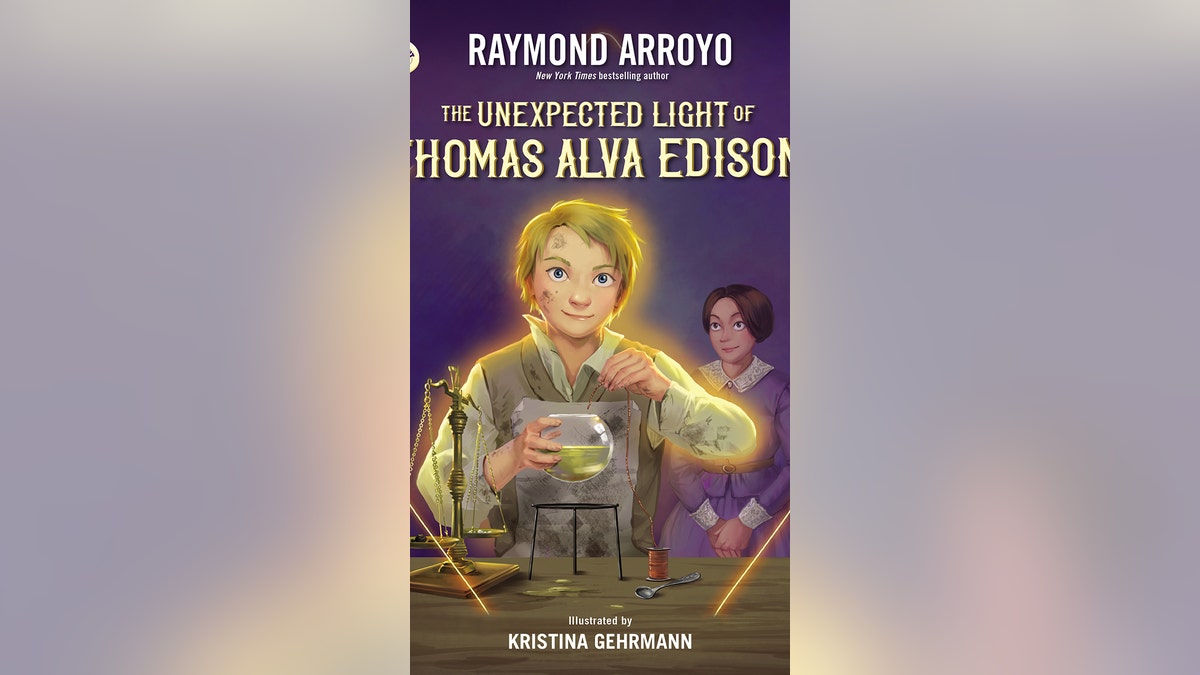
Raymond Arroyo's new illustrated book, out March 21, is "The Unexpected Light of Thomas Alva Edison," published by HarperCollins/Zonderkidz. (Raymond Arroyo)
"I came across an Edison biography," he said, "and there was a line in it that he wrote late in life. He said, ‘My mother was the making of me. She let me follow my bent.’"
Edison, born in 1847, went on to say, as Arroyo noted, that "if it had not been for her appreciation and her faith in me at a critical time in my experience, I should never have become an inventor.'"
Arroyo said, "I had never heard this piece of Edison's life. So I started digging back into some other biographies and pulled out this story."
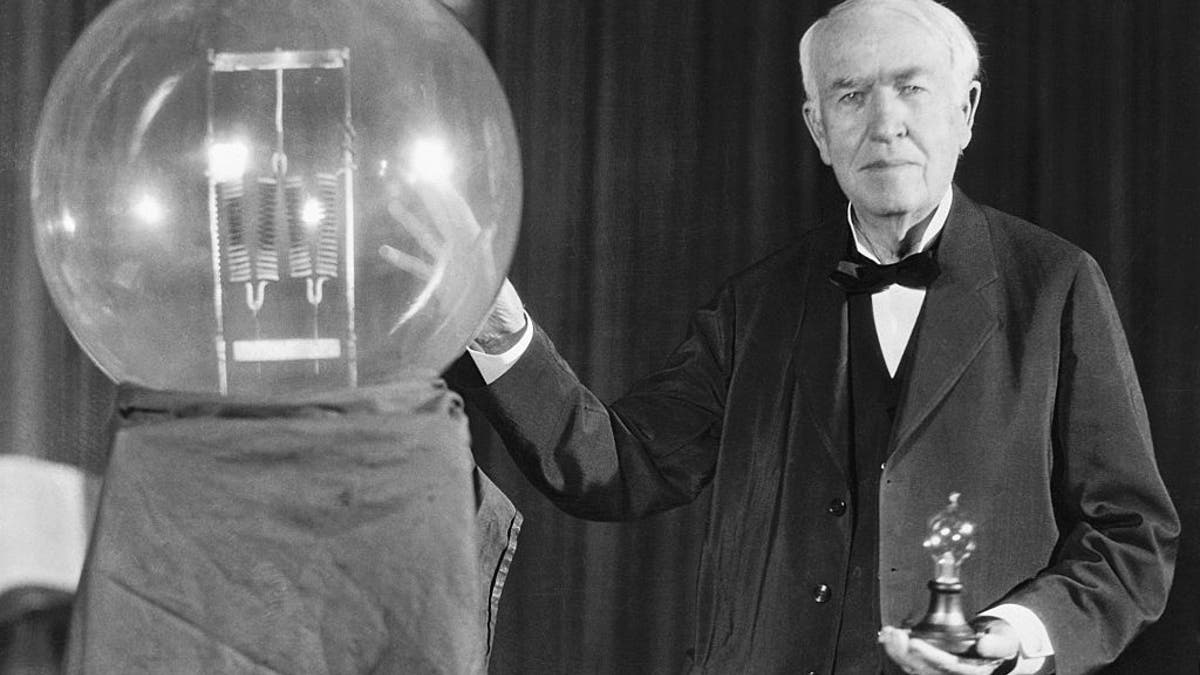
Thomas A. Edison, in this photo, exhibits a replica of his first successful incandescent lamp, which gave 16 candlepower of illumination, in contrast to the ultimate in today's achievement, a 50,000-watt, 150,000-candlepower lamp. (Getty Images)
Each of the "Turnabout Tales" in the new book series, Arroyo said, will capture "a bit of lost or neglected history that presents us with these figures whom we thought we knew, or perhaps didn't know at all, at a crisis point or crossroad in their life."
Often, he said, these people were told they "couldn't do" something or were told, "You're not good enough."
And in that critical moment, they made a decision "that changed all of history and opened up their destiny."
Each of the "Turnabout Tales" will capture "a bit of lost or neglected history" about key figures in history "at a crisis point or crossroad in their life."
In the case of Edison, said Arroyo, "his mother was the making of him. Think of it: He was thrown out of school. He was told he couldn't be taught — that he was ‘addle-brained.' And that is really at the center of the first turnabout tale in his life," added Arroyo.
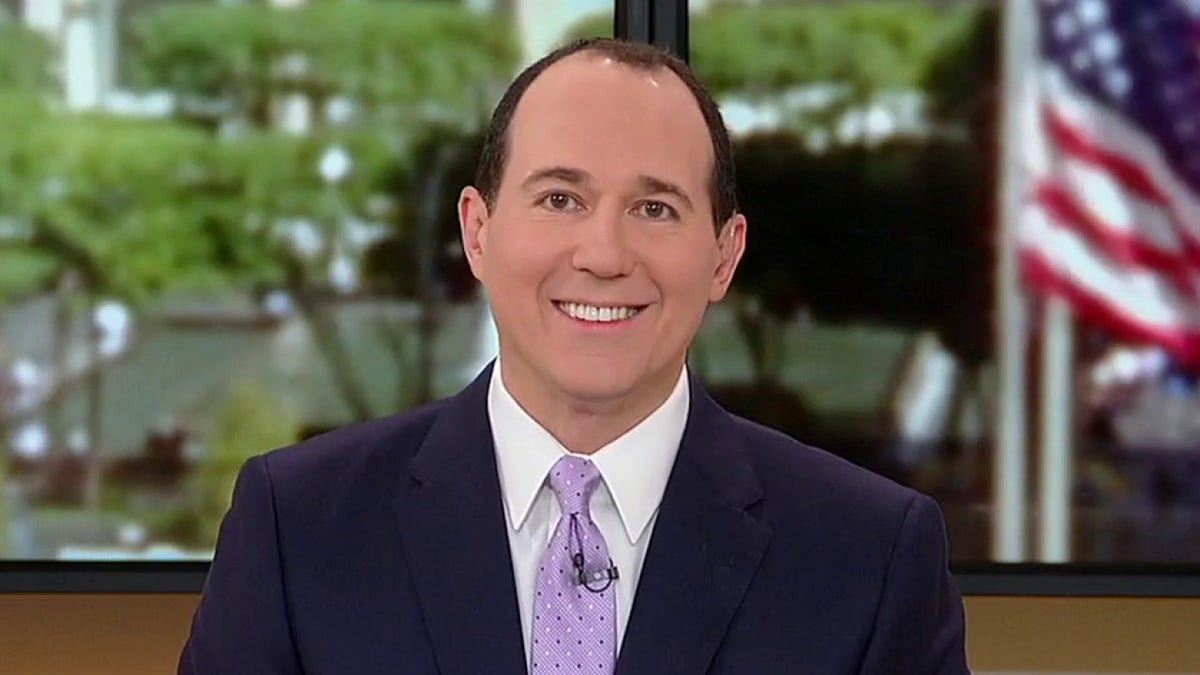
Raymond Arroyo is the creator of a new book series called the "Turnabout Tales," which provides a revealing look into seminal figures in world history. First up: a book about Thomas Alva Edison and how his curiosity was nurtured and developed. (Fox News)
"That really arrested my attention. I thought, Here's the greatest inventor of all time, and even the device we're talking through now," added Arroyo, meaning the microphone in the telephone — "wouldn't have been created. Or someone else would have created it, ultimately, but it was Edison who did," said Arroyo.
"Yet he never received any formal training. As soon as he was thrown out of school, his mother homeschooled him. I often tell people that Edison really should be the patron saint of homeschooling. His mother understood how his mind worked. And she knew how to feed his curiosity."
"She was the most enthusiastic champion a boy ever had, and I determined right then that I would be worthy of her."
His mother, Nancy Edison, said Arroyo, "was an educator by training, so she wasn't a novice. She really leaned in and gave him quite an exemplary education — and most of all, she empowered him to go and discover things on his own and to go and teach himself."
That is something, said Arroyo, that "I think we really neglect today in education."
Edison himself shared what happened to him in an interview published in T.P's Weekly in 1907, according to many accounts.
"One day I overheard the teacher tell the inspector that I was 'addled' and it would not be worthwhile keeping me in school any longer," wrote Edison.
He went on, "I was so hurt by this last straw that I burst out crying and went home and told my mother about it. Then I found out what a good thing a good mother is. She came out as my strong defender."
Edison continued, "Mother love was aroused, mother pride wounded to the quick. She brought me back to the school and angrily told the teacher that he didn’t know what he was talking about, that I had more brains than he himself, and a lot more talk like that … She was the most enthusiastic champion a boy ever had, and I determined right then that I would be worthy of her and show her that her confidence was not misplaced."
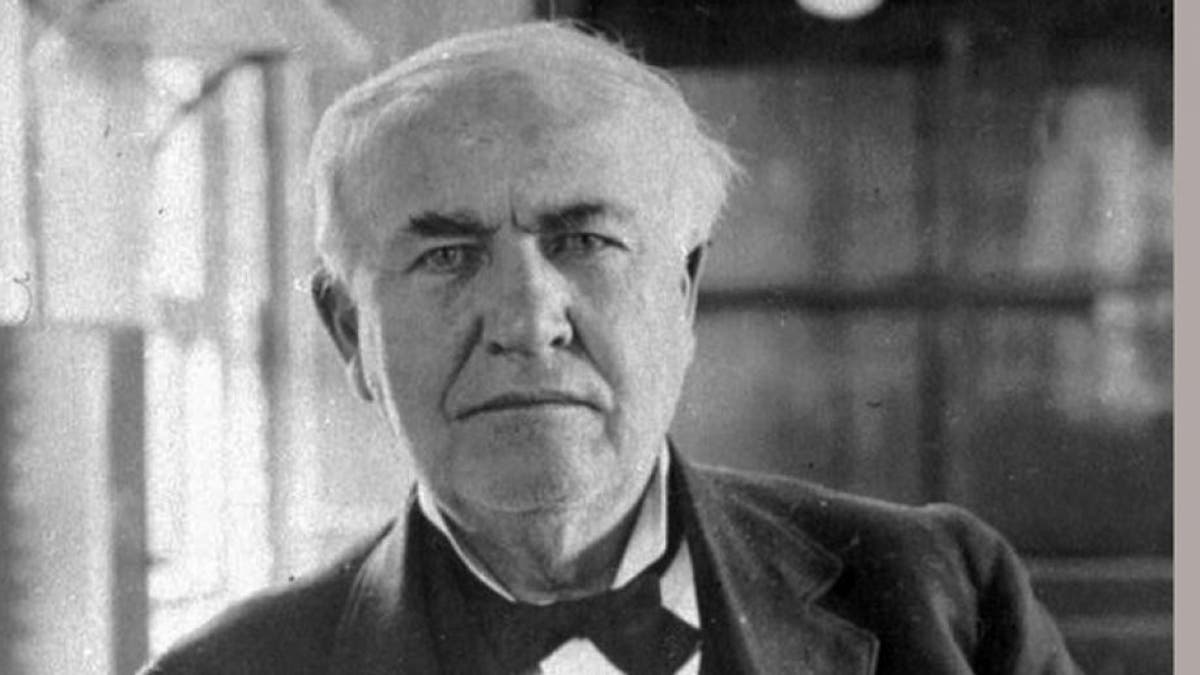
Even as an old man, Thomas Edison, said Raymond Arroyo, "was still experimenting, still sketching in his notebooks." (Associated Press)
From 1876 to 1879, Edison's most innovative period, he invented the telephone transmitter, the phonograph and the incandescent lamp, each in rapid succession.
Arroyo noted of the framing of his news series, "You can get it quickly. You can pull out the lessons that you need — which I wanted to do for kids and for their parents and educators as well."
"You can get it quickly. You can pull out the lessons that you need — which I wanted to do for kids and for their parents and educators."
He also said, "A lot of biographies of Edison today believe he probably had ADHD. There are 6 million kids diagnosed with ADHD in the United States, so this is not a small affliction, if you will — but it's not an affliction. It ends up being a blessing in many ways, certainly for Edison."
FAMILY AS CORNERSTONE OF SOCIETY: HOW TO CELEBRATE THE BIRTHDAY THAT MEANS THE MOST
And I think for "many of these children who have ADHD, channeling that particular way of seeing and perceiving the world is really important. This is what Nancy Edison did — she knew to allow him to dabble with chemicals in the basement to conduct his experiments, even as a boy, that that would occupy him both his body and his mind on a task."
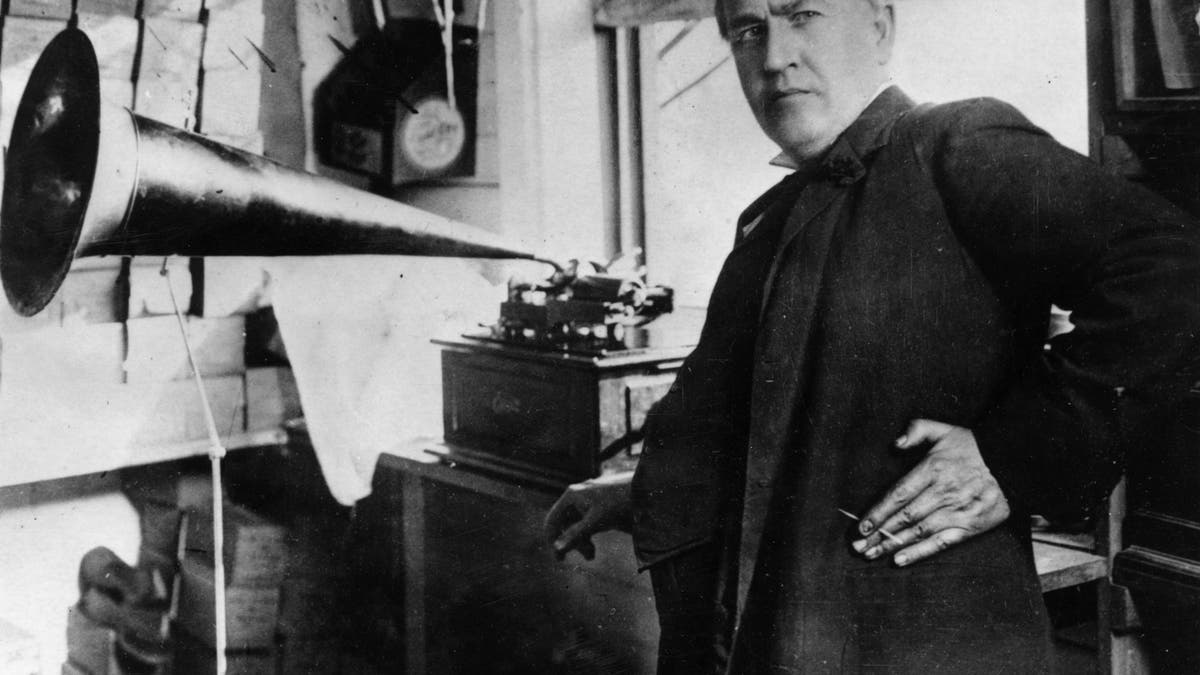
American inventor and businessman Thomas Edison (1847-1931) with an Edison Standard Phonograph, shown at his lab in West Orange, New Jersey, 1906. The Edison Standard Phonograph, a wax cylinder player, shown here with its sound horn supported on a tripod, was produced from 1898 to 1913. (Hulton Archive/Getty Images)
Arroyo said there were a lot of aspects of the Edison story that were fun to write about and capture in an illustrated book — almost like slapstick, he said.
"He blows up the lab in the basement. He sets off a baggage compartment where he's got a lab on fire. He burns down the family barn. You know, these experiments were not really quiet, solemn events," said Arroyo. "They were major catastrophes, in some cases! But it was a model for learning that would mark Edison's life well into adulthood."
The larger message is really "the importance of supporting children in their natural inclinations."
Even as an old man, said Arroyo, "he was still experimenting, still sketching in his notebooks."
For parents and caregivers, Arroyo said the larger message is really "the importance of supporting children in their natural inclinations — and of the gifts that children give to their parents."
He said this applies to future books in the "Turnabout Tales" as well.
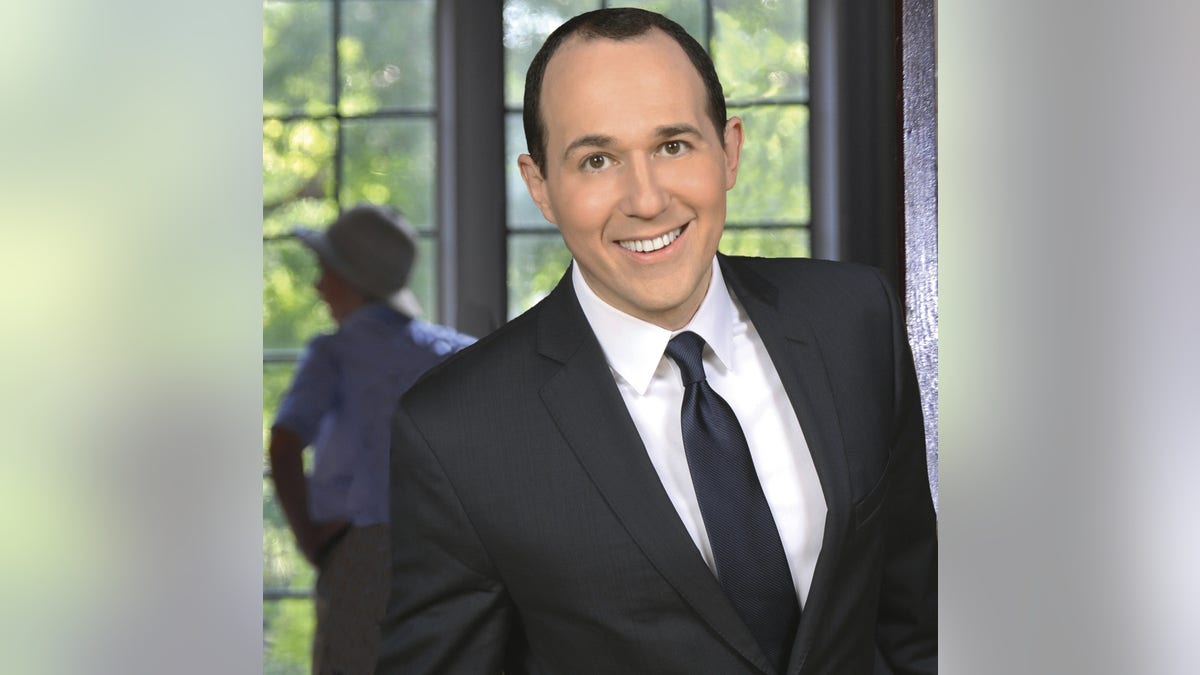
"The guy was constantly innovating for the public, not for his own self-expression," said Raymond Arroyo about Thomas Edison. "He said, ‘I never created anything that I didn’t see an audience for.' He was very practical." (Courtesy Raymond Arroyo)
"Edison had some principles that his mother gave him — and I think we can all profit from them. There are about four of them. One is never get discouraged if you fail because you learn from those failures. That's how he created — he was a creator by process of elimination. He built on others' failures."
’DAD JOKES' HELP KIDS DEVELOP INTO HEALTHY ADULTS: STUDY
Added Arroyo, "He didn't really create the light bulb. The arc bulb — the arc lamp — was already created. What they couldn't perfect was an iridescent bulb that would continue to glow. That was the puzzle that Edison solved. He created the vacuum seal and the proper conduit for the arc so that it would continue to glow."
"You have to experience the world. You have to go out there and get banged up a little bit."
Two, said Arroyo, "you learn with both your head and your hands. Edison was a tinkerer his whole life."
And "the third principle was, not everything of value in life comes from books. You have to experience the world. You have to go out there and touch it and even get banged up a little bit."
And fourth, said Arroyo, "is never stop learning. Read the entire panorama of literature — read everything."
Edison "was a hustler, which I love," said Arroyo. "The reason the man was able to create the microphone, the motion picture camera, the phonograph … perfect the telephone, perfect the light bulb — people forget the alkaline battery. The guy who created the first electric car was Thomas Edison. He was friends with Henry Ford — and he created a system, but Ford thought it was too expensive to replicate it."
CLICK HERE TO SIGN UP FOR OUR LIFESTYLE NEWSLETTER
And Edison was able to do all of this because he was a hustler.
"He was always trying to work harder than everyone else around him," said Arroyo. "The guy was constantly innovating for the public, not for his own self-expression. He said, ‘I never created anything that I didn’t see an audience for.' He was very practical."
All of the enthusiasm conveyed here takes shape in the new book, "The Unexpected Light of Alva Edison."
CLICK HERE TO GET THE FOX NEWS APP
Anyone wanting to join his virtual live book signing on March 21 at 6:05 p.m. EST can join in at https://livesigning.com/unexpectedlight.
Arroyo will also be traveling to Florida, Louisiana, California and other locations as part of his book tour. Details are at www.raymondarroyo.com.




















